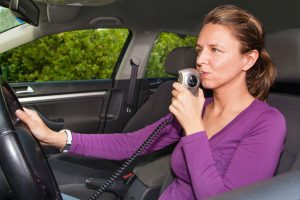Twin bills in the Florida House and Senate threaten to undercut the due process rights of defendants facing Broward DUI charges. HB 39 and SB 260 would require drivers who refuse to take a breathalyzer to install ignition interlock devices at their own expense – regardless of whether they are ultimately found guilty of violating F.S. 316.193, Florida’s DUI statute.
As a Broward DUI lawyer can explain, the proposed statute is aligned the existing implied consent law, F.S. 316.1932. Essentially, this law establishes that driving is a state-extended privilege, as opposed to a right. Therefore, by operating such a vehicle, the state has the right to impose certain requirements. One of those is that drivers agree to the condition that if they are going to drive, they have impliedly given their consent to submit to approved chemical or physical testing (namely breathalyzer tests) for the purposes of determining whether he/she was driving under the influence of alcohol. Such tests must be incidental to a lawful arrest and administered by a law enforcement officer who has reasonable cause to believe the driver is under the influence.
If a driver in these circumstances refuses to submit to a breathalyzer test, their driver’s license is automatically suspended for one year. This is true regardless of whether they are ultimately convicted of a DUI. For second or subsequent refusals, the suspension is 18 months.
What HB 39 and SB 260 would do is mandate that same driver also install an ignition interlock on their device. For those who may be unfamiliar, an ignition interlock is a sort of breathalyzer contraption that hooked up to one’s car. If the person registers a breath-alcohol concentration above the legal (or court-imposed) limit, the vehicle will not start. If the person has been convicted of DUI and is on probation with terms that require abstinence from alcohol, that report may also be sent to the probation officer/court.
Ignition interlock devices can cost anywhere from $700 to $1,600 annually – a sizable imposition for some folks.
The concern here from the perspective of a Broward DUI defense lawyer is that we’re imposing a punishment before a conviction. Our entire criminal defense system is predicated on the basic fact that defendants are presumed innocent until they are found guilty beyond a reasonable doubt in a court of law. Although the intentions behind measures like HB 39 and SB 260 are noble, it would make much more sense (and be less vulnerable to constitutional challenge) if lawmakers were to focus their efforts on the conviction side of a DUI, rather than on administrative suspension and ignition interlock.
For instance, lawmakers could make it a requirement for drivers who are convicted AND refused the breath test. Doing it this way could also help indigent people because there are provisions in place that allow a percentage of standard court costs and fines to go toward helping low-income Floridians cover the cost of mandatory ignition interlock devices.
Conviction for a DUI in Florida already carries the possibility of ignition interlock. It’s up to the judge’s discretion with the first offense, but becomes mandatory with second and subsequent convictions.
It’s also worth considering that administrative hearings just for implied consent license suspensions are delayed regularly. Such hearings can sometimes take up to 4 months. An analysis by state Senate staffers indicated they would need at least $1.1 million annually to hire more hearing officers should this proposal become law.
In an effort to reduce the number of administrative hearings in implied consent cases, lawmakers created incentives for low-income defendants not to fight the automatic suspension. They did this by requiring those who lost at the suspension hearing to wait at least 3 months before they can apply for a restricted license, which would allow them to drive to work, school, etc. The new bill would reduce that wait time to one month.
But if this bill passes, accepting both a license suspension and mandated ignition interlock lessen the appeal. Drivers will get to drive with restrictions for the year, give up their due process rights, AND pay for a $1,000 device on their car. If they fight it, though, they might only risk a one-month suspension. That’s going to increase the demand for hearings.
The Senate version of the bill passed unanimously in the Senate Committee on Transportation.
Call Fort Lauderdale Criminal Defense Attorney Richard Ansara at (954) 761-4011. Serving Broward, Miami-Dade and Palm Beach counties.
Additional Resources:
CRIMINAL DEFENSE BAR SAYS ALCOHOL-DEVICE BILL MAY SKIRT DUE PROCESS, Dec. 21, 2023, By Alexandra Glorioso, The Florida Bar
More Blog Entries:
4 Ways a Fort Lauderdale DUI Lawyer Can Challenge the Charges, July 4, 2023, Broward DUI Defense Lawyer Blog
 Fort Lauderdale Criminal Attorney Blog
Fort Lauderdale Criminal Attorney Blog


